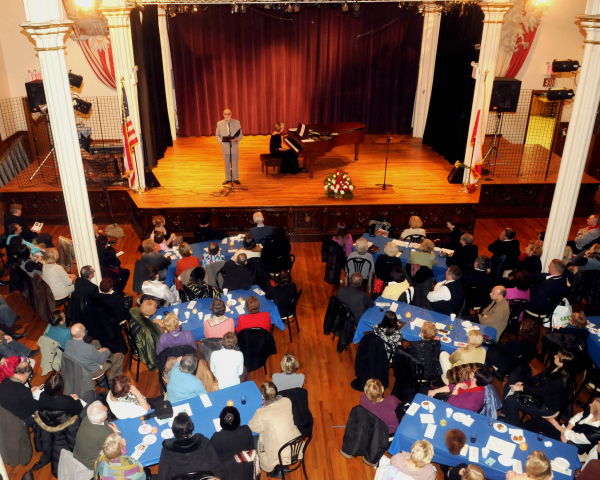
A portrait of Frederic Chopin by Delacroix
Ewa Kern-Jedrychowska produced this radio piece on the Chopin Bicentenary celebrations among the Polish community in Greenpoint, Brooklyn, for WNYC.
[audio: chopin.mp3]This year, fans of classical music are celebrating the 200th anniversary of Frédéric Chopin’s birth. Thousands of events honoring the composer are planned around the world, many of them in renowned New York venues, from the Metropolitan Museum of Art to Carnegie Hall.
One immigrant community is especially touched by the anniversary. Polish immigrants see this year as an opportunity to remind the world that–despite having a French father and spending two decades in France before his death–Chopin was in fact a Polish composer. As part of the tribute, almost all Polish community centers and institutions in the city are holding Chopin concerts, lectures and exhibits. They may be on a smaller scale and less formal than other New York events, but they gather Poles of all backgrounds. For them Chopin’s music can be very personal.
At the Polish and Slavic Center in Greenpoint, Brooklyn, Polish immigrants gathered to honor their greatest composer. Candles were lit and the mood was solemn. As the music plays some in the audience have tears in their eyes, others can’t help swaying their bodies. Sitting close to the stage is Andrzej Jeziorski, an elevator mechanic. When he arrived in the U.S. 20 years ago he managed to fit records of Chopin’s music in his suitcase.
“One image that I always see when I listen to Chopin are weeping willows, because I used to live in the Swietokrzyskie mountains area, and this music brings images of the place I come from. When I listen to his music, right away I see willow alley in my mind. I go back to my childhood, to Poland, to the place I came from, to my youth,” Jeziorski says, speaking in Polish.
“One time Arthur Rubinstein said Chopin is the soul of the piano. All moods and all human emotion are his… he is heroic, poetic, demonic, everything that the human being can feel is in Chopin’s music,” said David Dubal, American pianist and broadcaster. “Who would even want to live without Chopin?”
Some of Chopin’s pieces like the Funeral March have become so widely known that people all over the world consider them their own. “People don’t even have to know Chopin was Polish,” says Dubal.
But Poles say they have a special connection to the composer’s music. They say he captured Poland’s soul and when they listen to his music they feel emotional and nostalgic for their country.

A Celebration of Chopin at the Polish and Slavic Center in New York. (Photo: Marcin Zurawicz)
Born in ŻelazowaWola, a tiny village west of Warsaw, he returned to the Polish countryside throughout his childhood. There, he encountered peasants playing folk music and dancing traditional Polish dances–mazurkas and polonaises. These memories inspired many of his later pieces. “He put Poland in his music,” says Janusz Sporek, a musician and the Chopin event organizer.
“Chopin’s music may be universal, but I feel very lucky to have had access to those places where Chopin used to go to, like Zelazowa Wola where he was born and various places in Warsaw where his music was created,” said Rafal Blechacz, one of the most famous Polish contemporary pianists who played at the Metropolitan Museum of Art in New York earlier this year. “Definitely various dancing rhythms which are present in mazurkas and polonaises, we Poles can understand easier.”
Bozena Konkiel, a music teacher from Greenpoint, even uses dancing techniques in her classroom. “Because I am Polish and I know all these dances I can explain to my students what Chopin thought when he wrote this or that accent or he finished a phrase this way or another. And I dance for them.”
Polish immigrants also relate to the composer’s life of exile. In Chopin’s time Poland did not exist as a state. It was a territory partitioned by three powerful neighbors: Russia, Prussia and Austria. In 1830–while the composer was touring Europe–an uprising broke out in Warsaw. It was brutally suppressed by the Russian Empire, which forced many Polish artists into exile. The composer settled in Paris.
“Unfortunately, he never got a chance to go back to his country, seeing his family, his friends,” Sporek says. “So he was being convicted to stay out of his loving country with no chance of coming back. This is probably why we hear the music–so dramatic sometimes–that he composed.”
After moving to France in 1830, Chopin remained there until his death in 1849. Some French claim that the composer became part of their culture. But Poles like to say that Chopin may have lived in France for a while but his heart stayed in Poland forever. And, in fact, after his death his heart was actually removed from his body and brought to Warsaw, where it has been preserved in Holy Cross Church.
Irena Naglowska, a home attendant, has been living in New York for two years. With no family around she gets homesick. In Chopin’s music she finds company.
“His compositions are filled with nostalgia, longing for his country, at least that’s how I feel it. I miss my country a lot, and that makes us very close, connects us,” Naglowska says in Polish. “I think that this Polish-Slavic soul is there, we are able to grasp it, understand the depths of it. I feel that I was born with it. Every Slavic soul is so plaintive and tearful, that’s why I said I may start crying.”
The emotions that his compositions evoke in Poles have always been powerful. When the country struggled for its independence in the 19th and 20th centuries, Chopin’s music was almost considered a weapon. The composer Robert Schumann said it was like “cannons buried in flowers.” Years later, the Nazis must have heard those metaphorical gunshots, because they banned Chopin’s music during their World War II occupation.
Today Chopin remains a national icon in Poland.
“Each child in Poland knows who Chopin was and they might not even know kings, Polish kings, and the other politicians, but they know, 100 percent, who Frédéric Chopin was,” says Bozena Konkiel. A piano teacher back in Poland, Konkiel now teaches music at a Catholic school in Greenpoint, several blocks away from the Polish and Slavic Center. For her, introducing Chopin to children comes with a mission.
“I think we’re very proud of him and we all in the United States try to be his ambassadors,” Konkiel says. “I’m working in American school, and in this school I already have introduced Chopin’s 200th anniversary. We had a concert, we had a PowerPoint presentation about Chopin, and children in this school, American, Irish, whoever they are, they know who Chopin was.”
All year long Poles in New York have been organizing events commemorating Chopin’s anniversary – at their community centers and various Polish institutions. They also dream about organizing a grand finale of celebrations in the Big Apple. “We are working on bringing the Szczecin University Academia Chamber Orchestra here in December,” said Jerzy Stryjniak, founder and president of The Chopin Society of New York.
When Chopin died at 39 he was remembered around the world as one of the great geniuses of classical music. Today, many Poles still carry his music and his memory in their hearts.




